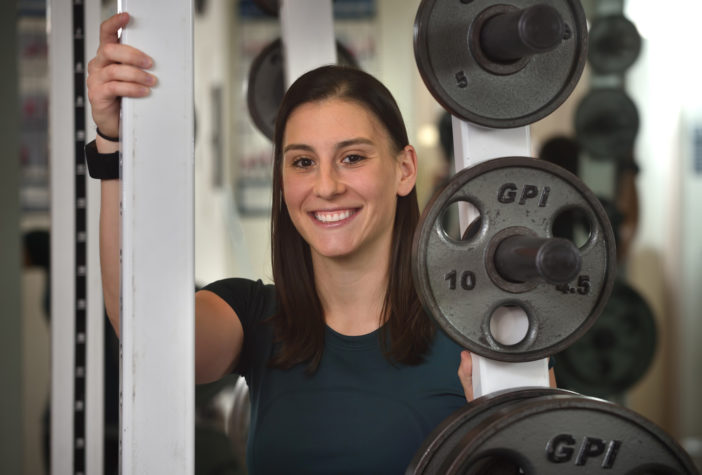Police officers face a multitude of stressors, from physically demanding and long work days, to life-threatening confrontations with criminals, to the emotional toll of seeing people living in challenging situations – sometimes all within the same shift.
While exercise offers one way to deal with stress (and improve health), the Anaheim Police Department provides its employees with an extra tool – the department’s wellness program.
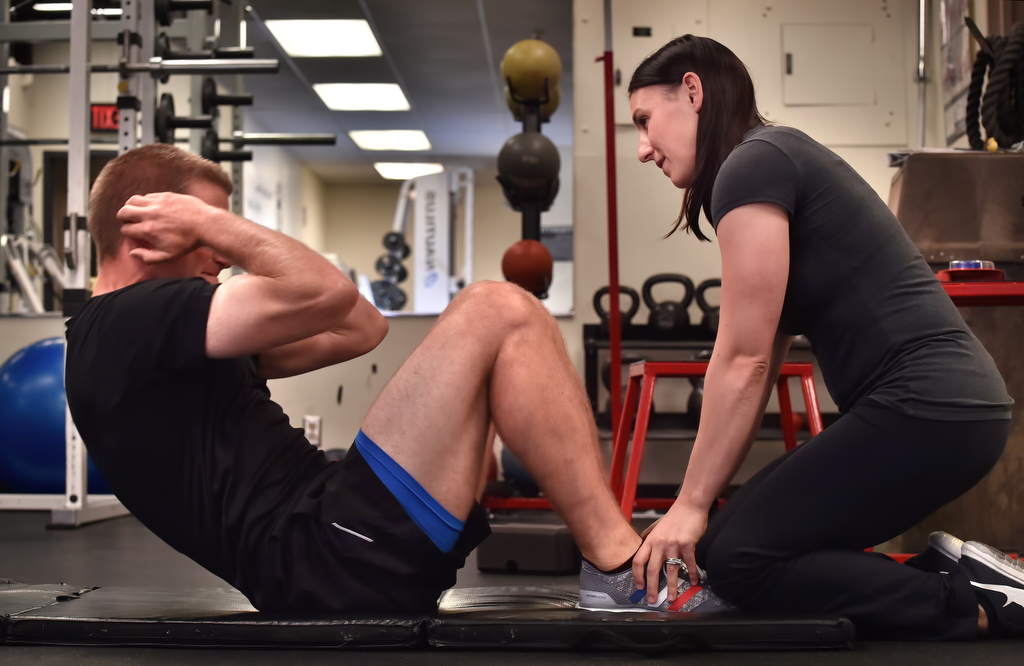
Anaheim Police Officer Matt Ellis completes 54 sit-ups in one minute during a wellness test given by Marci Guzman, right.
Photo by Steven Georges/Behind the Badge OC
The program, designed and implemented by Wellness Solutions starting in 2000, includes an annual Wellness Incentive Program (WIN) that rewards those who participate.
This year, WIN has reached its highest level of participation, with 305 signed up – including more than 60 percent of the sworn population.
Wellness Solutions’ Wellness Director Marci Guzman, has been on site at the Anaheim Police Department for about three years. She oversees the WIN program, as well as individual training sessions, nutrition consults, educational seminars, and more.

Marci Guzman, wellness coordinator for Wellness Solutions, in the workout room at the Anaheim Police Department.
Photo by Steven Georges/Behind the Badge OC
“We have an awesome group here,” Guzman said. “It’s a testament to the officers and employees that they want to participate and they want to be involved. They’re really excited and energetic about learning about their health and continuing to make improvements so that they can help the community.”
WIN participants receive a complete health assessment, with an EKG-monitored treadmill test and blood test, as well as flexibility, strength, and endurance tests to create a benchmark from which to gauge improvement.
The program’s ultimate goal is to reduce the risk of heart disease, diabetes, and other long-term health issues, as well as build strength and cardiovascular health and reduce stress for the officers.
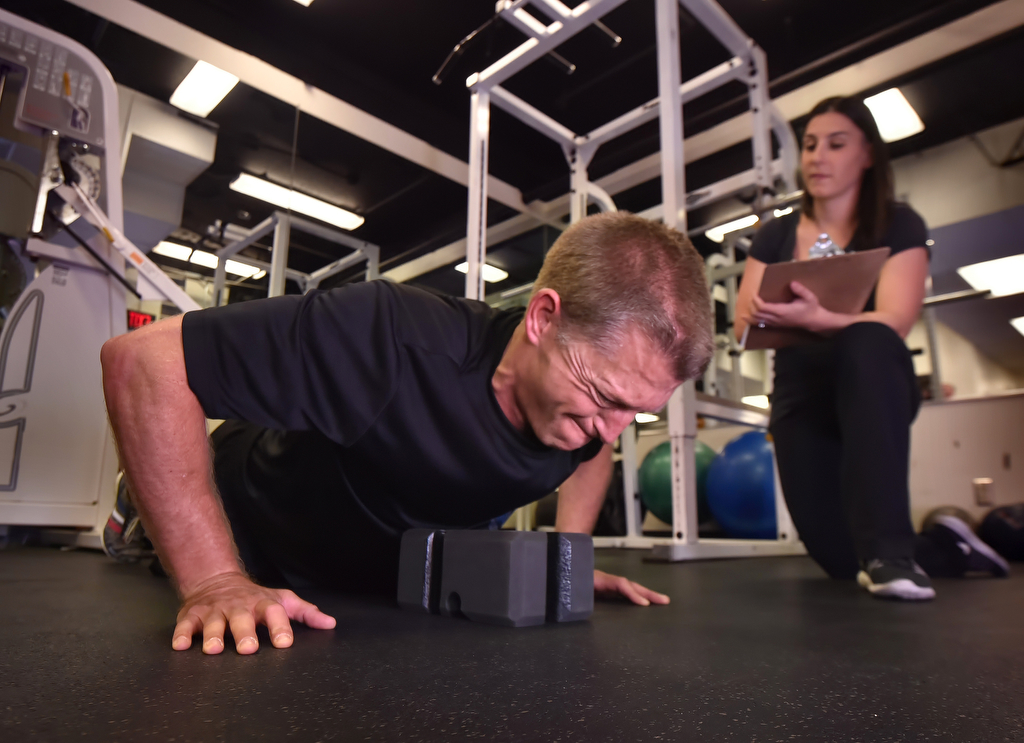
Anaheim Police Officer Matt Ellis completes his 51st pushup during a wellness test given by Marci Guzman.
Photo by Steven Georges/Behind the Badge OC
Employees who complete WIN can earn $200 per year toward a gym membership or fitness equipment and can earn up to 12 hours of paid leave. Sworn employees who don’t pass an annual obstacle course are mandated to participate in the WIN program, Sgt. Daron Wyatt said.
“It pushes you to want to do well,” said Officer Brian Bonczkiewicz, a 10-year WIN participant. “I think having the program is a huge benefit.”
Working out helps manage stress, said Officer Matt Ellis, who has participated in WIN since he joined the Anaheim Police Department 10 years ago. The program can also help participants identify health issues they weren’t previously aware of, and gives them the ability to track progress, Ellis said.
“If we are more physically fit and we take better care of ourselves, then we’re going to be working longer or harder and they’re going to get more productivity out of us,” Bonczkiewicz said. “So, it’s a benefit for both of us as I can hopefully live longer and be in better condition and they get a more well-rounded, healthy employee.”
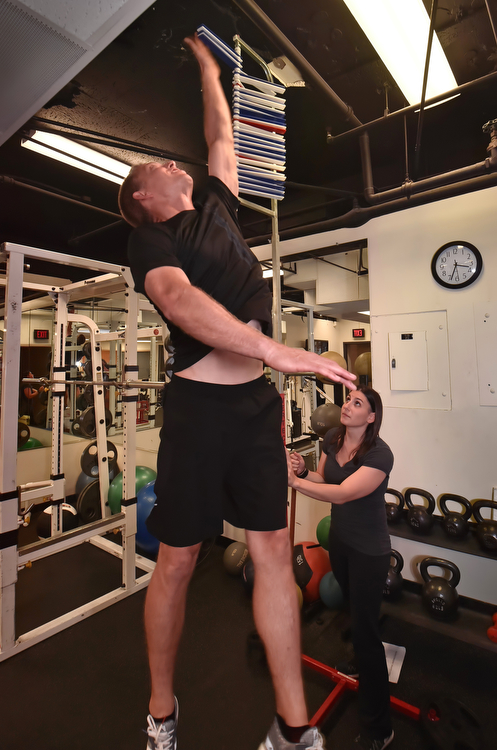
Anaheim Police Officer Matt Ellis pushes over the top bar of 9 feet, 5.5 inches, during a jumping test given by Wellness Coordinator Marci Guzman, right.
Photo by Steven Georges/Behind the Badge OC
WIN also helps promote major disease prevention by examining cholesterol and glucose numbers, which could denote risk of heart disease or diabetes.
“We’ll review their results and we’ll look at any lifestyle changes that can be made to help make improvements,” Guzman said. That doesn’t just include diet – Guzman, who has a background in physical therapy, suggests exercise routines, stress reduction tips (such as mindfulness, meditation, and breathing techniques), and eliminating or decreasing smoking.
“On a day-to-day basis what the law enforcement community comes across is extremely different from what an average person’s day is like,” Guzman said. “So it’s not just, ‘How do I physically overcome that?’ but ‘How do I mentally prepare for that or recover from that?’”

Anaheim Police Officer Matt Ellis successfully completes a bench press as Marci Guzman acts as spotter during a wellness test. Numbers on the weights appear backwards because the photo was shot through a mirror.
Photo by Steven Georges/Behind the Badge OC
The program’s resources are immensely helpful, said Officer Collin Brennan, who’s been a WIN participant since he joined the Anaheim Police Department five years ago.
“There is so much you can take out of it, especially if you’re an active person,” Brennan said. “This kind of keeps me on point here, because our job’s very physically demanding.”
Guzman also conducts educational seminars and holds mobility classes at the station.
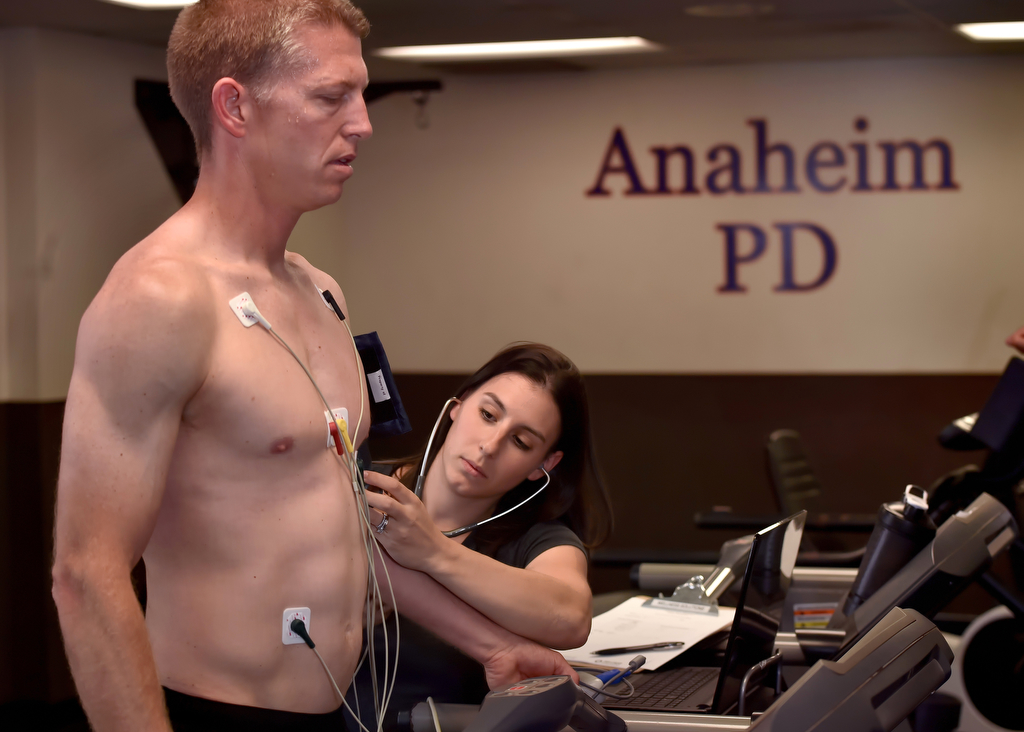
Marci Guzman, wellness coordinator for Wellness Solutions, monitors Anaheim Police Officer Matt Ellis’ heart during a test on the treadmill.
Photo by Steven Georges/Behind the Badge OC
“Over the years, it’s been a little bit of a culture shift,” Guzman said. “Ultimately, it’s for their own health and it also benefits the public in the sense that we’re getting our officers healthier, more fit, and then they can perform their job tasks better.”
According to a 2015 report titled, “Health, Safety, and Wellness Program Case Studies in Law Enforcement” published by the Office of Community Oriented Policing Services, “evidence suggests that policing provides unique sets of stressors that may place officers at particularly high risk for early deaths, heart attacks, and other health-related problems.”
Furthermore, the report states, “Some of the common law enforcement stressors are job-related, while others may be associated with the negative consequences of shift work and the corresponding impact on sleep patterns and disorders, which are often twice as high among police officers compared to members of the general public.
Guzman is working to combat all these issues, and even gives advice on what times to eat for those working graveyard shift.
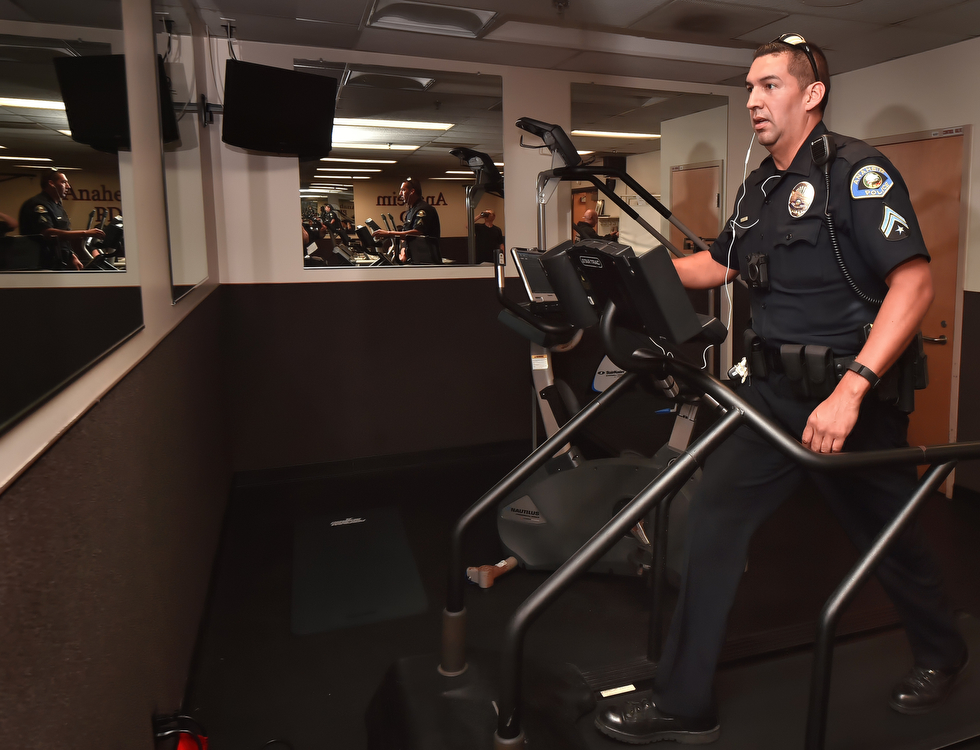
Anaheim Police Officer German Alvarez uses the treadmill in the workout room at the Anaheim Police Department.
Photo by Steven Georges/Behind the Badge OC
She recommends eating a larger meal earlier in the evening and then healthy snacks throughout the rest of the night, which she says, “has been really beneficial to help stabilize glucose levels, and lower risk for Type 2 Diabetes. Furthermore, since the sleep patterns are altered on graveyard shift, officers are combating the natural circadian rhythm and finding more consistent eating patterns can help minimize negative effects on the metabolic system.”
“Really, it’s about longevity in their career and their life after their career and being able to enjoy all of the benefits of the hard work that they’ve put in,” she said. “They do so much for the community and we want to make sure that we’re looking after them as well.”
 Behind the Badge
Behind the Badge
